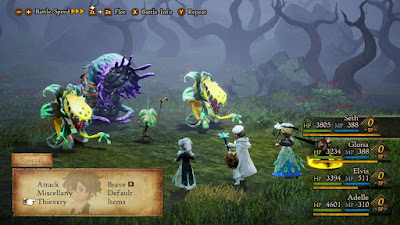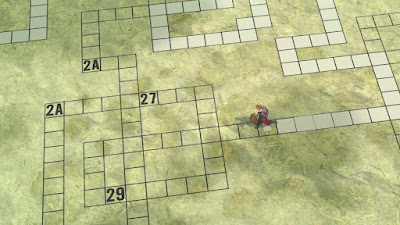Although I played a lot of games in 2021, only about half of them were actually released this year. And even then, most were far from the AAA efforts that tend to fill similar GOTY write-ups.
Still, I hope those who read this post will enjoy the thoughts I share below on what I consider to be my favorite games of 2021.
Something to consider as you scroll: I've sadly yet to experience a good handful of 2021 releases that I expect would've made this list had I gotten around to playing them. Among the games in question: Fuga: Melodies of Steel, The Great Ace Attorney Chronicles, NEO: The World Ends with You, Undernauts: Labyrinth of Yomi, and Voice of Cards.
Bravely Default II (PC/Switch)
You're probably already aware that the character models in this Bravely Default sequel are less visually appealing than their counterparts in the original. Bravely Default II's soundtrack doesn't hit the same highs as the previous game's either.
Even so, I found Bravely Default II to be enormously compelling. The claymation-inspired, diorama-esque world is a joy to race around, and its battles exist somewhere within the same exhilarating realm as those found in the first Bravely Default and the oft-similar Octopath Traveler.
The cherry on top of this sadly divisive RPG: the bonkers story, which becomes more and more compelling--not to mention bizarre--the deeper you delve into it.
Deltarune Chapter 1&2 (PC/PS4/Switch)
I dragged my feet on plunging into the first two chapters of Deltarune until late this year because, frankly, I couldn't fathom how they'd even remotely reach Undertale's splendorous heights. Boy, was I wrong. I don't know that I could declare Deltarune chapters one and two to be better than the whole of Undertale, but I also wouldn't argue with anyone who makes such an assertion.
For me, the main area in which Deltarune bests its precursor is combat. Battles in Deltarune have more depth and are more strategic than those in Undertale. I also found them more fun, truth be told. I can't quite say the same about Deltarune's characters, story, or soundtrack. In particular, Queen and Lancer pale in comparison to their Undertale counterparts, Sans and Papyrus, though the former are by no means duds.
Whatever. All I know is I'm itching--desperately--to play Deltarune's remaining chapters, however many Toby Fox and crew decide to release into the world. For me, that makes the whole "which is better?" discussion moot. At least until the next time I play through Undertale (wink wink).
Dungeon Encounters (PC/PS4/Switch)
Dungeon Encounters offers up a terrible first impression, looking like one of Square Enix's lowest effort titles ever. Give it a whirl, though, and you're sure to realize, as I quickly did, it's a minimalistic Etrian Odyssey viewed from a decidely different perspective.
Even that sells this digital RPG short, though, as I enjoyed playing Dungeon Encounters more than I've enjoyed playing any Etrian Odyssey title to date. I also managed to finish Dungeon Encounters--something I've yet to do with Etrian Odyssey's many releases.
Why? The sense of mystery and exploration is strong in Dungeon Encounters. Not only do you map out floors of a dungeon, but you solve riddles to find new abilities, party members, treasures, and even the final boss. Also, the game practically begs you to break it in various ways. Once you've acquired certain abilities, you can jump around the 99-floor dungeon nearly at will. As you might expect, there's a risk-reward element to this play style, but that's yet another feather in Dungeon Encounters' cap.
All in all, if you're usually an RPG fan and you're up for tackling a tough one (though not unfairly so) that dares to stray from the norm, give serious consideration to Dungeon Encounters in 2022.
Gnosia (Switch)
Raging Loop was among my favorite games of 2020. One of the main reasons I loved Raging Loop so much was that it deftly blended aspects of the social-deduction game, Werewolf, into what is otherwise a spooky visual novel.
Gnosia also incorporates aspects of Werewolf into its gameplay. It's not a VN, though. Rather, it's more of a Werewolf simulator. The end result is every bit as gripping as you might expect if you've ever experienced Werewolf in some form or fashion. If you haven't, the gist here is that you're on a spaceship with a slew of extremely colorful characters (literally and figuratively) and you need to suss out which are Gnosia, alien-like creatures who will, without intervention, kill all humans aboard.
The thing is, you don't play through Gnosia just once. You play through it many, many times. A single loop may take as little as a few minutes or as long as a quarter-hour or more. While working your way through a particular loop, you'll regularly encounter event scenes that expand one or more characters' backstories. Only after you experience all of these scenes can you access Gnosia's true ending.
Really, though, the ending is the icing on this pixelated piece of cake. The real joy comes in the journey to that point--getting to know your crewmates, using what you glean there to your advantage (or their disadvantage), and figuring out what you need to move the overarching story toward its satisfying conclusion.
Mon Amour (PC/Switch)
After I played Onion Games' Mon Amour for the first time following its release, I thought, "this is cute, but I probably won't spend much time with it." I returned to it the next day, mostly to give it a quick second chance before moving on to something more my speed. Instead, I got wrapped up in its silly quest to rescue Princess Mona and her multitude of servants. I intended to only save a few of the latter, but by the time I'd done just that, I was hooked--or at least I was hooked enough to continue on rather than prematurely pull the plug on my Mon Amour adventure.
I'm so glad that happened. Because that's when I discovered there's more to this little gem than its Flappy Bird-ish gameplay, plethora of rescuable "mon-a-girls," and appropriately zany soundtrack. Notably, it's surprisingly strategic once you realize how your actions affect the playfield. With that knowledge in mind, you'll likely have as hard a time as I did putting down Mon Amour until you've saved every citizen, climbed the high-score list to an acceptable degree, or both.
SaGa Frontier Remastered (Mobile/PC/PS4/Switch)
I've been enamored with SaGa Frontier since first laying eyes on Japanese screenshots of it in some old gaming magazine or other in advance of its late-1990s release. For me, it was far closer to what I wanted from Square Enix (then Squaresoft) during the 32-bit era than Final Fantasy VII was.
I'm even more appreciative of what SaGa Frontier brings to the table today, thanks to the fact that it's now portable and sports a cleaned-up--and thus less confusing--localization. As it always was, SaGa Frontier remains thrillingly exotic, with locales, characters and battles that inspire awe while also getting the eyes popping and blood flowing.
True, SaGa Frontier can be brutal, with death lingering around nearly every corner. But even that is a positive, in my mind--considering how common it is for battles in RPGs to feel yawn-inducingly superfluous.
See also: my favorite games of 2020












